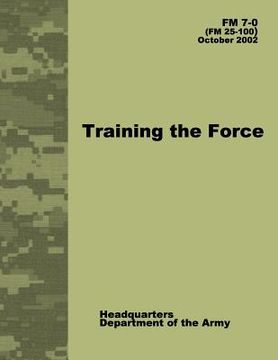Synopsis "Training the Force (FM 7-0) (in English)"
The U. S. Army exists for one reason-to serve the Nation. From the earliest days of its creation, the Army has embodied and defended the American way of life and its constitutional system of government. It will continue to answer the call to fight and win our Nation's wars, whenever and wherever they may occur. That is the Army's non-negotiable contract with the American people. The Army will do whatever the Nation asks it to do, from decisively winning wars to promoting and keeping the peace. To this end, the Army must be strategically responsive and ready to be dominant at every point across the full spectrum of military operations. Today, the Army must meet the challenge of a wider range of threats and a more complex set of operating environments while incorporating new and diverse technology. The Army meets these challenges through its core competencies: Shape the Security Environment, Prompt Response, Mobilize the Army, Forcible Entry Operations, Sustained Land Dominance and Support Civil Authorities. We must maintain combat readiness as our primary focus while transitioning to a more agile, versatile, lethal, and survivable Army. Doctrine represents a professional army's collective thinking about how it intends to fight, train, equip, and modernize. When the first edition of FM 25-100, Training the Force, was published in 1988, it represented a revolution in the way the Army trains. The doctrine articulated by FMs 25-100, Training the Force, and 25-101, Battle Focused Training, has served the Army well. These enduring principles of training remain sound; much of the content of these manuals remains valid for both today and well into the future. FM 7-0 updates FM 25-100 to our current operational environment and will soon be followed by FM 7-1, which will update FM 25-101. FM 7-0 is the Army's capstone training doctrine and is applicable to all units, at all levels, and in all components. While the examples in this manual are principally focused at division and below, FM 7-0 provides the essential fundamentals for all individual, leader, and unit training. Training for warfighting is our number one priority in peace and in war. Warfighting readiness is derived from tactical and technical competence and confidence. Competence relates to the ability to fight our doctrine through tactical and technical execution. Confidence is the individual and collective belief that we can do all things better than the adversary and the unit possesses the trust and will to accomplish the mission. FM 7-0 provides the training and leader development methodology that forms the foundation for developing competent and confident soldiers and units that will win decisively in any environment. Training is the means to achieve tactical and technical competence for specific tasks, conditions, and standards. Leader Development is the deliberate, continuous, sequential, and progressive process, based on Army values, that develops soldiers and civilians into competent and confident leaders capable of decisive action. Closing the gap between training, leader development, and battlefield performance has always been the critical challenge for any army. Overcoming this challenge requires achieving the correct balance between training management and training execution. Training management focuses leaders on the science of training in terms of resource efficiencies (such as people, time, and ammunition) measured against tasks and standards. Training execution focuses leaders on the art of leadership to develop trust, will, and teamwork under varying conditions-intangibles that must be developed to win decisively in combat.

